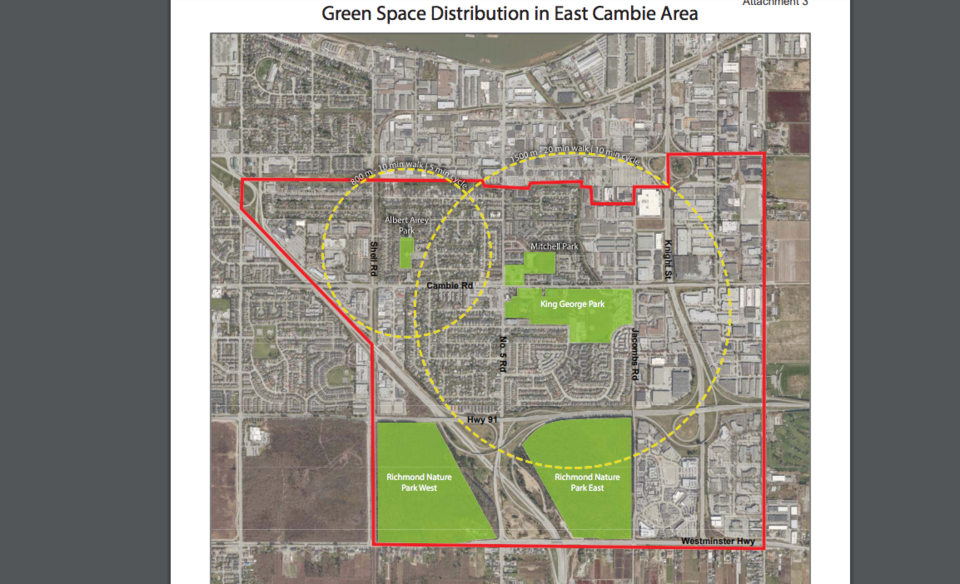Five privately owned properties next to King George Park are designated for future park expansion, but city staff say they’re not a priority for acquisition and recommend pulling off the park designation.
One property owner, Amy Ho, asked council at a specially held meeting to change the designation because she said she can’t do anything with her property when it’s earmarked for park.
Ho said she wasn’t told by the realtor when she bought the property that it had a park designation, but Coun. Harold Steves replied “that’s not our problem, unfortunately.”
In its recommendation to council, city staff say the East Cambie area has more greenspace than other areas of the city, and acquiring more isn’t a priority.
The city aims to have about eight acres of park and open space for every 1,000 residents.
But the East Cambie area exceeds this goal three times over, with almost 25 acres of park per 1,000 residents, according to the city’s calculations.
However, some councillors questioned whether Richmond Nature Park should be counted as park in the East Cambie area given it’s largely a natural area with just a few kilometres of walking trails and doesn’t have playing fields.
Coun. Michael Wolfe said Richmond Nature Park can’t have a lot of people at once and there are “a lot of limitations” to the park, for example, no dogs are allowed there.
Richmond Nature Park is 200 acres in size, while other parks and open spaces in the East Cambie area total 79 acres.
The five lots, located at the corner of Cambie and No. 5 roads, are assessed at $7 million and would add less than one and a half acres to the 49-acre King George Park.
Todd Gross, director of parks services with the city, told council if the parks designation stayed on the properties, the status quo would remain “for a long time” as other areas in the city need park space before the East Cambie area.
“We only have so much money, but we have higher priorities elsewhere,” Gross said.
He added, if park space were added in the East Cambie area, city staff would look elsewhere in the neighbourhood as King George Park already has a lot of amenities.
Steves pointed out council has a “long-standing policy” of buying lots on the perimeter of parks at market value.
Furthermore, he added, the city has been buying higher priority properties over the past few decades.
“These (five lots) were lower on the list, but we didn’t take them off the list,” Steves said. He questioned whether other properties with park designation would also be removed as well.
City staff also recommended that four of the lots be allowed to be developed into townhouses.
Serena Lusk, the city’s general manager of community services, said it’s a “strange position” for city parks staff to be recommending removing a parks designation, but the plan to allow the properties to be developed into townhouses would give better access to the King George Park and direct funds to higher park priorities.
Coun. Carol Day said removing the park designation now would be giving up “the ace in the hole.”
The park designation allows the city to negotiate more community amenities if a rezoning application for the properties comes to the city, she added.
Richmond Mayor Malcolm Brodie suggested referring the matter back to staff for more information. He said, while he sees both sides of the argument, it’s “unfair to designate something park and in our plan acknowledge it’s never going to happen.”
Only Day opposed the referral.



